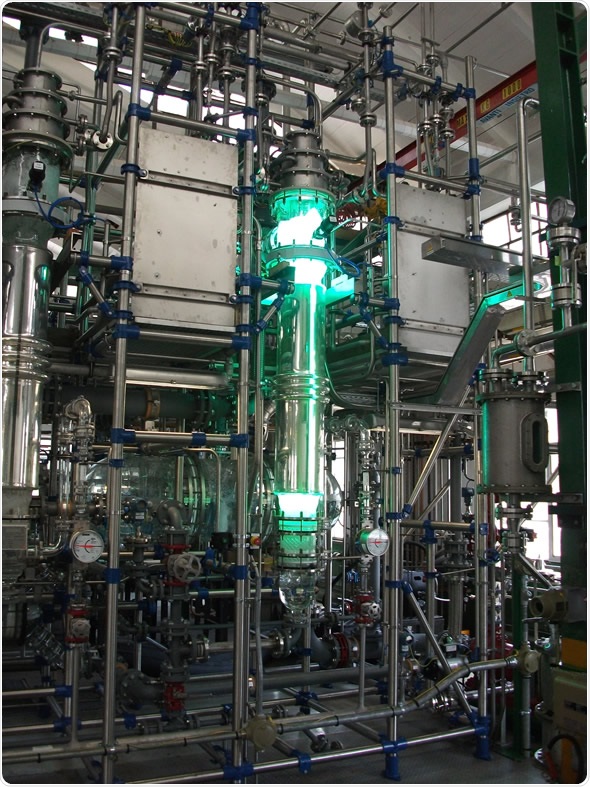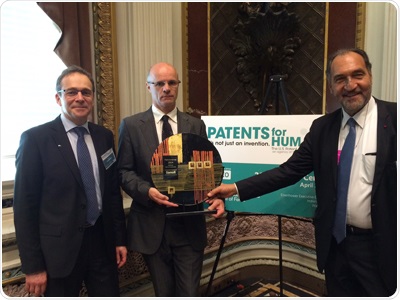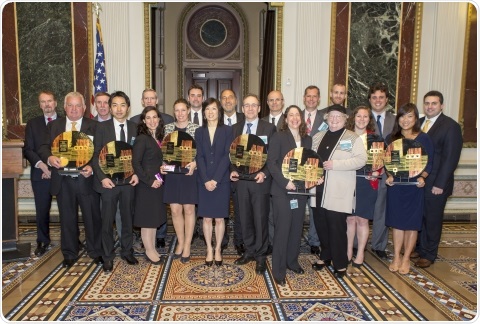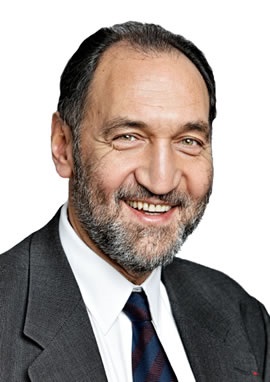Sponsored Content by SanofiJun 28 2015
Sanofi was recently awarded one of the US Commerce Department’s United States Patent and Trademark Office (USPTO) prestigious “Patents for Humanity” awards. Please can you explain why Sanofi was recognized with this award?
Sanofi is proud and humbled to receive the “Patents for Humanity” award. We are being recognized for a patent that covers an innovative chemical and industrial process for producing semi-synthetic artemisinin, utilized in anti-malarial therapies.
Since 2014, more than 16 million anti-malarial treatments derived from the Sanofi patented process for semi-synthetic artemisinin have been supplied to endemic countries in Africa.
Patents for Humanity Ceremony
How important is artemisinin in the production of anti-malarial drugs?
Artemisinin is a key component for the production of anti-malarial drugs. The World Health Organization (WHO) recommends artemisinin-based combination therapies (ACTs) as the most effective antimalarial medicines available today.
Without alternatives to artemisinin expected for several years, its efficacy and access must be preserved.
Why can artemisinin be difficult to obtain and how does the new process for semi-synthetic artemisinin minimise the risk of shortages?
Artemisinin derives from the sweet wormwood plant (Artemisia annua) grown predominantly in China and Vietnam, and more recently in some African countries, including Madagascar and Kenya.
Growing cycles, variations in yield and other factors can produce variable supplies of artemisinin, making it difficult to obtain.
The new process for semi-synthetic artemisinin produces a high quality, stable supply that complements the existing plant-derived source, helping to minimize the risk of shortages and reducing production lead times.

What impact will winning this award have?
The “Patent for Humanity” award underscores our sustained commitment to the fight against malaria and increasing access to medicines in underserved communities worldwide.
We know we have more work to do; in Africa, one child dies of malaria every minute. Malaria is preventable and with treatment, malaria is curable.
How important has Sanofi’s commitment to public-private partnerships been in this achievement?
This award is a testament to Sanofi’s commitment to open innovation and public-private partnerships. The semi-synthetic artemisinin partnership began in 2004 and is led by PATH, with funding from the Bill & Melinda Gates Foundation.
Other partners include the 2013 “Patent for Humanity” award winner UC Berkeley and the industrial bioscience company Amyris, Inc.

What further collaboration do you think is needed to continue the fight against malaria and to increase access to medicines in underserved communities?
According to the WHO, an estimated 584,000 people died from the disease in 2013. Only through collaboration and partnership with academia, government and non-government organizations will we make a greater and lasting impact on this disease.
Should we be concerned by artemisinin-resistance?
Artemisinin-resistance is a concern that we are actively pursuing through our public-private partnerships that focus on containment and interventional efforts.
According to the WHO, artemisinin-resistance is confirmed in five countries – Cambodia, the Lao People’s Democratic, Myanmar, Thailand and Viet Nam.
Patients with artemisinin-resistance recover providing different drugs are added to their original ACT. The resistant cases have largely been the result of non-adherence to treatment and the use of artemisenin monotherapy—a practice that the WHO recommended stopping in 2007.

What are Sanofi’s plans for the future with regards to tackling malaria?
Sanofi is working to improve access to healthcare in developing countries. Its Access to Medicines group develops sustainable models based on partnerships to provide quality healthcare to the most disadvantaged patients for diseases such as malaria, where the company has a recognized expertise.
Beyond the provision of medicines, Sanofi develops comprehensive, community-based programs with local partners to train healthcare professionals, inform communities and educate patients about the prevention, diagnosis and treatment of malaria and other diseases.
Where can readers find more information?
Your readers can learn more about our programs to fight malaria through the following resources on our Sanofi website:
About Dr. Robert Sebbag
 Dr. Robert Sebbag is currently Vice President Access to Medicines at Sanofi. This Division is involved in developing the Sanofi strategy for affordable medicines in southern hemisphere companies.
Dr. Robert Sebbag is currently Vice President Access to Medicines at Sanofi. This Division is involved in developing the Sanofi strategy for affordable medicines in southern hemisphere companies.
Prior to joining Sanofi, Dr. Sebbag worked in Brussels for the European Pharmaceutical Industry Association (EFPIA) where he was responsible for building a communication platform for all pharmaceutical companies operating in Europe.
Previously, he served as Senior Vice President Communications at Aventis Pasteur (now Sanofi Pasteur), a vaccine specialist.
In addition to his activities within the pharmaceutical industry, Dr. Sebbag is a research associate with Paris hospitals (tropical diseases, parasitic diseases and AIDS) and a lecturer at the University of Paris VI.
Dr. Sebbag is also a Board member of the French Red Cross and has participated in many humanitarian missions in the developing world. He is a trained medical doctor specializing in tropical and parasitic medicine, and has a background in psychiatry.